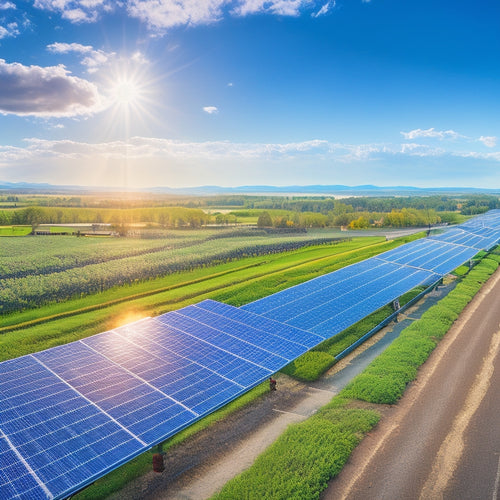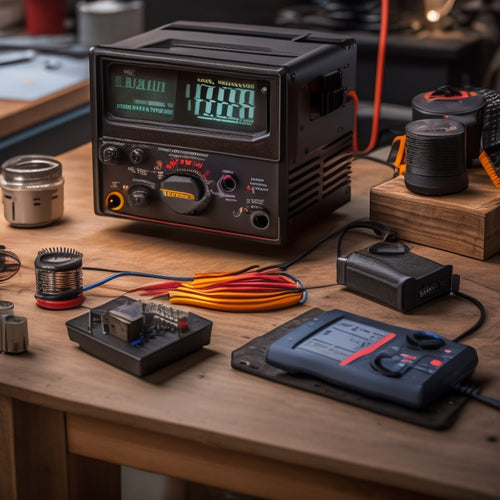
Implementing Off Grid Electrical Systems Challenges
Share
Implementing off-grid electrical systems poses several challenges, including high initial setup costs and complex logistics. You need to carefully assess your energy needs to select appropriate components, like solar panels and batteries, for optimal efficiency. If you're considering a DIY installation, it's vital to have the technical skills; otherwise, hiring professionals can guarantee reliability but may increase upfront expenses. Additionally, energy management is significant for balancing supply and demand, especially during low-generation periods. Each decision impacts long-term savings and system performance, so understanding these factors is key to your success. Investigate these elements further for a more thorough grasp.
At a Glance
- Accurate assessment of energy needs is crucial to avoid system overload and ensure efficiency in off-grid setups.
- Installation logistics and budget planning are essential to prevent unexpected costs during the implementation of off-grid systems.
- Selecting the right energy sources and optimizing load management can significantly impact the reliability of off-grid systems.
- Regular maintenance is necessary to ensure system longevity and performance, posing a challenge for some users.
- Navigating financing options and government incentives can be complex but is vital for reducing upfront costs in off-grid projects.
Cost-Effective Energy Solution
When considering off-grid electrical systems, you must weigh the initial setup expenses against the long-term savings potential.
Investing in efficient technologies can notably reduce your reliance on costly grid electricity over time.
Initial Setup Expenses
Maneuvering the initial setup expenses of an off-grid electrical system is crucial for guaranteeing a cost-effective energy solution.
You'll need to focus on installation logistics and budget planning to avoid unexpected costs that can derail your project. Start by evaluating the components required for your system, such as solar panels, batteries, and inverters. Each element has its associated costs, and understanding these will help you allocate funds appropriately.
Next, consider the installation logistics. Are you planning to do it yourself, or will you hire professionals?
DIY can save you money, but it requires technical know-how. Hiring experts may be pricier upfront, but can minimize long-term issues and secure peak system performance.
Long-Term Savings Potential
After addressing the initial setup expenses, it's time to evaluate the long-term savings potential of an off-grid electrical system. By conducting a thorough investment analysis, you'll realize the financial benefits that come with this energy independence.
| Cost Factor | Traditional Grid System | Off-Grid System |
|---|---|---|
| Initial Investment | High | Moderate |
| Monthly Energy Bills | Ongoing | Minimal |
| Maintenance Costs | Variable | Fixed |
| Government Incentives | Limited | Significant |
| Lifespan | 20+ years | 25+ years |
The table above highlights how an off-grid system can save you money in the long run. While traditional grid systems incur continuous costs, your off-grid setup can lead to reduced monthly energy bills and lower maintenance expenses. Additionally, financial incentives like tax credits and rebates can further offset your initial investment.
Embracing off-grid energy solutions not only grants you freedom from utility companies but also sets you on a path towards sustainable living. Ultimately, the long-term savings potential makes it a wise choice for those looking to invest in their energy future.
Sustainable Energy Independence
To achieve sustainable energy independence, you need to carefully consider your energy source selection, as it directly impacts efficiency and reliability.
This includes evaluating the benefits of accurate system design, which guarantees your system meets your specific energy needs.
Additionally, understanding the system maintenance requirements is essential for securing long-term functionality.
Energy Source Selection
Selecting the right energy source is fundamental for achieving sustainable energy independence in off-grid electrical systems. You've got various options to evaluate, such as wind turbines and hydro power, each offering unique benefits. Conducting a thorough site assessment will help you determine the most feasible renewable resources based on local conditions.
Energy efficiency plays a significant role in your selection process. By optimizing load management, you can reduce energy consumption and enhance the performance of your system.
Hybrid systems, which combine different energy sources, provide a flexible solution that maximizes reliability and minimizes dependence on any single resource.
Incorporating energy storage solutions is essential for balancing supply and demand. It guarantees you have power even when renewable sources are intermittent. Additionally, effective power conversion technologies can improve efficiency and make better use of the generated energy.
Lastly, evaluate grid connectivity options, as they can serve as a backup during prolonged low-generation periods.
Ultimately, your energy source selection lays the groundwork for a sturdy off-grid electrical system, enabling you to achieve true energy independence.
System Maintenance Requirements
While establishing an off-grid electrical system can lead to energy independence, maintaining that system is fundamental for long-term sustainability and efficiency. To guarantee system longevity, you must develop thorough maintenance schedules customized to your specific setup. Regularly check your solar panels, batteries, and inverters to prevent performance degradation.
Implementing effective troubleshooting techniques becomes essential when issues arise. Familiarize yourself with common faults and their solutions to minimize downtime. Performance monitoring tools can help you track system efficiency, allowing for timely interventions.
Consider the environmental impact of your maintenance choices; use eco-friendly products to align with your sustainability goals. As technology evolves, plan for equipment upgrades to enhance system performance.
User training is significant—confirm everyone involved understands the system's operation and maintenance requirements. This enables you to execute repair strategies effectively and nurtures a culture of responsibility and independence.
Key Components Overview
When setting up an off-grid electrical system, selecting the right solar panels and determining your battery storage capacity are essential steps.
You need to assess your energy needs and environmental conditions to guarantee peak performance.
Solar Panel Selection
Your choice of solar panels is crucial to the efficiency and performance of an off-grid electrical system. Focus on panel efficiency to maximize energy production, especially in limited sunlight conditions. Investigate installation techniques that guarantee ideal positioning and angle to capture sunlight effectively.
Keep in mind the environmental impact; select panels made from sustainable materials to align with your values of freedom and independence. Stay informed about technology advancements in solar panels, as they can greatly enhance energy yield.
Consider size optimization to fit your space while still meeting your energy demands. Brand comparisons are essential; research reputable manufacturers that offer reliable products with solid warranty considerations. A strong warranty can protect your investment against potential failures.
Aesthetic integration is also crucial, especially if your panels are visible; choose options that complement your property's design. Confirm your system adheres to regulatory compliance standards to avoid legal issues down the line.
Battery Storage Capacity
Understanding battery storage capacity is crucial for optimizing your off-grid electrical system's performance. The choice of battery chemistry—whether lithium-ion, lead-acid, or others—affects everything from energy density to cycle lifespan. You'll want to evaluate various storage technologies to guarantee they align with your energy needs and usage patterns.
Capacity optimization hinges on understanding discharge rates and how they impact your system's efficiency. Higher discharge rates can be beneficial for peak demands but may reduce overall lifespan if not managed correctly.
Temperature effects also play a critical role; batteries can lose capacity in extreme conditions, so consider this when designing your system.
System integration is essential for seamless operation, as your battery storage must work harmoniously with other components like solar panels and inverters. Look for scalability options that allow you to expand your system as your energy demands grow.
Regular maintenance practices will secure longevity and reliability, keeping your off-grid experience as liberating as possible. By focusing on these key areas, you can maximize battery storage capacity and create a strong off-grid electrical system customized to your needs.
Selecting Based on Energy Demand
When selecting an off-grid electrical system, you need to accurately assess your daily energy needs to guarantee you meet your consumption requirements. This involves taking stock of appliances, lighting, and electronics for daily energy usage and creating an energy profile with device power ratings and usage hours.
Evaluating system capacity is essential; it helps you determine the right components to support your lifestyle without overloading your setup. By understanding both your energy demand and system capabilities, you can create a reliable and efficient off-grid solution.
For a more thorough approach, consider energy-efficient appliances that can notably reduce your overall consumption.
Assessing Daily Energy Needs
Evaluating daily energy needs is critical for designing an efficient off-grid electrical system, as it directly influences the selection of components and their capacity. Start by analyzing your energy consumption patterns. Identify the devices you use daily, their wattage, and how long each one operates. This data helps you create a thorough energy profile that reflects your actual needs.
Next, consider potential lifestyle adjustments that could optimize energy usage. For instance, you might decide to limit the use of high-demand appliances or shift certain tasks to daylight hours to utilize solar energy effectively. By making these adjustments, you can markedly reduce your overall energy demand, leading to a more sustainable and cost-effective system.
Additionally, assess seasonal variations in energy needs. Your consumption might fluctuate due to heating, cooling, or increased activity during specific months. Accounting for these variations is essential for accurate system design.
Ultimately, a clear understanding of your daily energy needs enables you to select the right components, ensuring your off-grid system meets your lifestyle while promoting energy independence and sustainability. This foundational step is fundamental for maximizing the efficiency and longevity of your off-grid electrical system.
Evaluating System Capacity Requirements
Selecting the right system capacity is essential for aligning your off-grid electrical setup with your energy demands. To achieve this, you need to conduct a thorough load assessment, which involves identifying and quantifying all the devices and appliances you'll be using. This step lets you understand your peak and average energy needs, giving you a solid foundation for your capacity planning.
Once you've gathered this data, energy forecasting comes into play. With accurate forecasting, you can predict your future energy consumption based on seasonal variations and lifestyle changes. This understanding helps you avoid under- or over-sizing your system, which can lead to inefficiencies and increased costs.
You should also consider factors like battery storage, inverter capacity, and the potential for future energy needs—perhaps you'll want to add more appliances or expand your living space.
Balancing these elements requires a careful analysis of your current and anticipated loads. By grasping your energy profile, you'll be enabled to create a resilient off-grid system that meets your needs, ensuring you enjoy the freedom and independence that comes from generating your own electricity.
Lower Long-Term Operational Costs
When you're operating off-grid, managing your energy expenses is essential for long-term sustainability.
By investing in efficient energy solutions, you can greatly reduce your ongoing costs.
This approach not only lowers your monthly energy bills but also enhances the overall viability of your off-grid system.
Reduced Energy Expenses
Reduced energy expenses are a significant advantage of off-grid electrical systems, providing long-term operational cost savings that can change your energy budget. By investing in renewable sources like solar or wind, you're not just cutting ties with traditional utility companies; you're also improving your energy efficiency.
This shift allows you to capture free energy from the environment, reducing your reliance on expensive utility alternatives. When you generate your own power, you can avoid the fluctuating rates and hidden fees associated with conventional energy providers.
Over time, these savings compound, creating a more stable financial outlook. Additionally, off-grid systems encourage you to optimize energy consumption, promoting a lifestyle of sustainability and self-sufficiency. You'll find yourself making smarter energy choices, which can lead to even lower costs.
Furthermore, as technology advances, the upfront investment for off-grid systems becomes more affordable, with options for financing and incentives. By choosing this path, you're not only investing in your future but also embracing a lifestyle that prioritizes independence from rising energy costs.
Ultimately, reduced energy expenses enable you to take control of your financial destiny while contributing positively to the environment.
Frequently Asked Questions
What Are the Legal Regulations for Off-Grid Systems in My Area?
You should research your local zoning laws and permit requirements for off-grid systems. Understanding these regulations will help you maneuver legalities, ensuring your setup complies while maximizing your freedom to live sustainably.
How Do I Maintain My Off-Grid Electrical System?
To keep your off-grid electrical system humming smoothly, focus on system monitoring and battery maintenance. Regularly check connections, clean terminals, and guarantee batteries are charged. This way, you'll enjoy uninterrupted freedom without a hitch!
What Are Common Safety Concerns for Off-Grid Systems?
When considering common safety concerns for off-grid systems, you must prioritize battery management and load balancing. Neglecting these can lead to overheating, system failures, or even hazardous situations, jeopardizing your desired freedom and autonomy.
How Do Weather Conditions Affect Off-Grid Energy Production?
Weather conditions can drastically impact your off-grid energy production. Solar efficiency drops on cloudy days, while wind variability introduces unpredictability. Seasonal fluctuations necessitate strong energy storage solutions to guarantee renewable reliability and mitigate climate impact.
Can I Connect My Off-Grid System to the Grid Later?
Yes, you can connect your off-grid system to the grid later. Future planning is essential; guarantee your system supports grid integration. This flexibility allows you to enjoy energy independence while keeping options open for the future.
Explore More
In the grand quest for energy independence, implementing off-grid electrical systems isn't just a challenge—it's an electrifying journey! With costs that could rival a small fortune, steering through energy demands feels like solving a riddle wrapped in a mystery. But fear not! By adopting sustainable solutions and understanding key components, you can change your energy environment into a powerhouse of efficiency. Imagine slashing operational costs so dramatically that your wallet might just do a happy dance! Accept the challenge!
Related Posts
-

Top Eco-Friendly Camping Equipment for a Sustainable Adventure
When you're camping with the planet in mind, opt for eco-friendly gear like tents made from recycled materials and bi...
-

Applications of Photovoltaic Systems
Photovoltaic systems are versatile, converting sunlight into electricity for various applications. You can use them i...
-

Key Features of a DC to AC Converter
A DC to AC converter features high efficiency and conversion rates, which reduce energy costs and improve performance...


